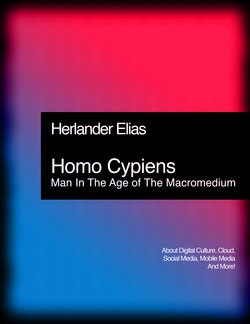Читать книгу Homo Cypiens - Herlander Elias - Страница 28
На сайте Литреса книга снята с продажи.
10.The Perimeter of Ignorance
ОглавлениеNever as now has so much information and knowledge been available, furthermore, and at the same time, the perimeter of ignorance has never been so great. It would be advisable to reduce the perimeter of ignorance, but unhappily it is not. Current generations dealing with mass media and digital media are not interested in learning, in the deep knowledge of things. They think that the information available in the media is forever guaranteed and that it can be found by a fingers clicking or touch. The problem is that the Net as we know it will end one day. More and more countries place restrictions on access to the Net, and with some countries controlling it only manipulated mass media are available.
The perimeter of ignorance should be short. At a time like ours, digital media corroborate an unparalleled presence in our lives as if we were just ignorant because we wish to be it. Everything is available. Everyone can access to. Only those who do not want to access to information, do not do it. But what it is the motive for which they do not? It is in this contradiction that our discussion is centered. What is happening now is a strange phenomenon: we have access to all kinds of information, everyone has access to the same information, but some of us choose not to do it.
Formerly, the perimeter of ignorance was wider. Many people could not study because families did not have money, global information was almost impossible to reach because we only mastered the mother tongue or because the educational institutions were geographically distant for us. What happens at the moment is more bizarre. There are more public and private educational institutions. There are more news agencies and Net and digital media are packed with sub-media, news aggregators and other means of information. In this way, those who are informed it is because they do want. The same is to say that if everyone has access to the same information, it fails to inform since the new "new" has ceased to exist. World news are spread on a large scale and leave out the volunteer ignorant. Beyond this kind of "ignorant" there is the non-synchronized ignorant. However, as a contradiction, in general there are more people accessing the media to find out what happens in the world.
It is true that there is a crisis in the world of information and it is also true that there is an excess of information, there is redundancy, moreover there is also a certain lack of originality in the content, not to mention how fake news (which no one confirms) circulate in digital media. The problem of information in the perimeter of ignorance is that it no longer contributes to the reduction of this perimeter and is currently causing it to increase. This means that the information is not informing, and the individuals who were once classic readers are no more interested in it. Today, no one reads the whole texts, instead they are read in a superficial way, and only a few lines are caught by the current reader's attention. There is not enough time to digest the huge amount of information and for deep thinking. We have opted to have more time to watch news videos than to read or write. The increase in the perimeter of ignorance has serious repercussions in the world of consumption, education and politics. Well-informed citizens make voluntary choices based on data; ignorant citizens choose products, narratives and political candidates emotionally. They are easy to handle. It seems that we have two opposing forces in confrontation. On one side, we have amateur and institutional news producers, and on the other, we find people interested in information becoming redundant and entropic, people who think that information is a utopia. What stands out in the present society is that nobody is, in fact, correctly and really informed.
For the younger the scenario is more sui generis. Young people accentuate the widening of the perimeter of ignorance or its shortening. There are young people disconnected from the real, living in their own world of social networks and video games, but there are also young people who do research and learn from other young people online. For the latter, the available resources of the network are still, for the time being, accessible true gold, since the fusion of capitalism and information complicates access to the media. At present the tendency is for all available content, from entertainment, information or knowledge to become paid services. And again this accentuates the widening of the perimeter of ignorance, since more people can be left out of the media access.
To be very explicit, an ignorant is not the same as an innocent. An innocent does not know and does not hurt others. An ignorant can inadvertently do something wrong, and that does not make him an innocent. When we talk about access to content, knowledge and information, we have many innocents, people who are not to blame for capitalizing on digital media, but we have even more ignorant ones, people for whom the lack of access to information and knowledge is not a serious matter. Their lives seem to suffer from a superficial and dark world, a disconnected and of no interest existence. These people's lives reflect their denial to exercise citizenship and of to be well informed in order they find support in their choices. And, once again, we come back to our main discussion — without effective means of support there are no real choices. A citizen who is uninformed, uninterested or misinformed, or even excessively informed by redundant information, makes mistakes in his selections, meaning that their choices are based on fragile criteria.
